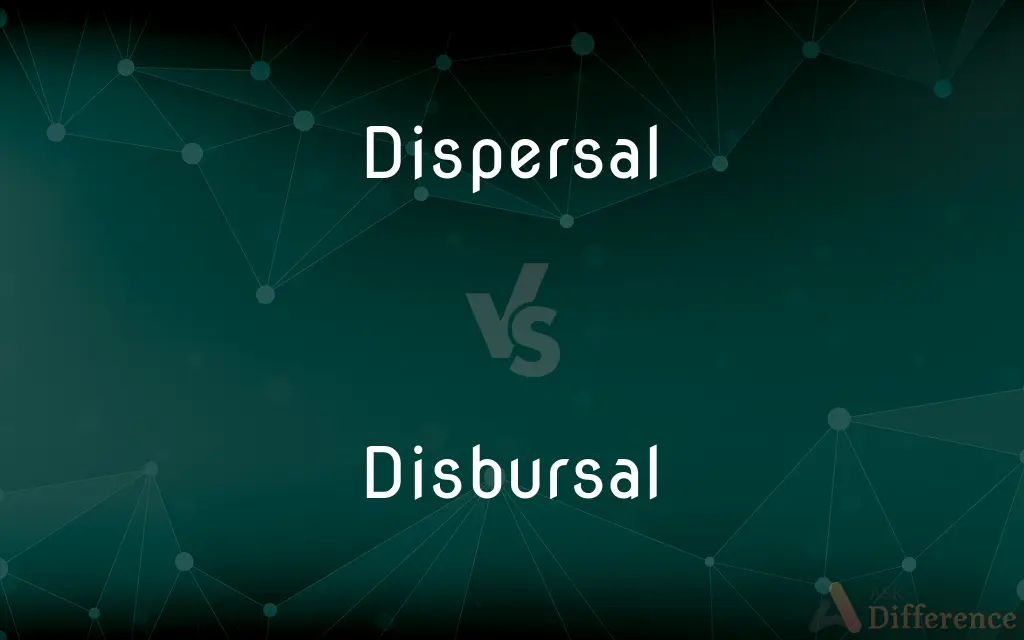Dispersal vs. Disbursal — What's the Difference?
Edited by Tayyaba Rehman — By Urooj Arif — Updated on April 28, 2024
Dispersal involves spreading or scattering things widely, often randomly, whereas disbursal refers specifically to the distribution of money or funds.

Difference Between Dispersal and Disbursal
Table of Contents
ADVERTISEMENT
Key Differences
Dispersal generally refers to the act of spreading something, often entities or individuals, across a wide area. This can include seeds, animals, or even people in different contexts. Disbursal, on the other hand, specifically deals with the distribution of funds or resources, usually in a controlled and deliberate manner.
In ecological contexts, dispersal is a critical process where organisms spread from one location to another, which is essential for propagation and genetic diversity. In financial contexts, disbursal refers to the payment or distribution of money among multiple parties, crucial for business operations and financial management.
While dispersal can happen naturally, like the dispersal of plant seeds by the wind, it can also be planned, such as the relocation of populations. Disbursal, however, is always a planned process involving the allocation of money, whether it's for salaries, grants, or other expenses.
Dispersal's purpose is often to ensure survival, growth, and reach, whether of ideas, genes, or individuals. Disbursal’s purpose is to manage and allocate financial resources effectively, ensuring the proper functioning of an organization or system.
The mechanisms of dispersal vary widely, from biological processes in nature to human-driven activities in sociology or economics. The mechanisms of disbursal, whereas, involve financial transactions, accounting practices, and administrative processes.
ADVERTISEMENT
Comparison Chart
Definition
Spreading something widely.
Distribution of funds.
Contexts
Ecological, social, geographic.
Financial, administrative.
Mechanisms
Natural forces, human activities.
Financial transactions, accounting.
Purpose
Survival, propagation, distribution.
Financial management, allocation.
Examples
Seed dispersal, animal migration.
Salary payments, fund allocations.
Compare with Definitions
Dispersal
Distribution that ensures spread and growth.
Efficient dispersal mechanisms are crucial for species survival in ecology.
Disbursal
The financial management activity involving payment.
Accurate record-keeping simplifies the disbursal process in large organizations.
Dispersal
The process of sending members of a group to different places.
The company's dispersal of employees to various international offices was part of its global strategy.
Disbursal
The act of distributing or paying out money.
The prompt disbursal of funds was essential for the project’s timely completion.
Dispersal
Spreading widely into different directions.
After the concert, there was a rapid dispersal of the crowd.
Disbursal
Payment from a dedicated fund or budget.
The government’s disbursal of relief funds helped to stabilize the economy.
Dispersal
The act of distributing particles or entities spatially.
The dispersal pattern of pollutants in the ocean varies with currents.
Disbursal
The process of allocation of monetary resources.
The charity ensured fair disbursal of donations to the affected areas.
Dispersal
The action or process of distributing things or people over a wide area.
The dispersal of seeds by wind aids in plant reproduction.
Disbursal
Distributing money according to a plan or system.
The grant’s disbursal was contingent on meeting specific milestones.
Dispersal
The act or process of dispersing or the condition of being dispersed.
Disbursal
Disbursement.
Dispersal
The act or result of dispersing or scattering; dispersion.
Disbursal
The act of disbursing money.
Dispersal
A dispersal prison.
Disbursal
The amount of money paid for something, especially the amount that may be tax-deductible.
Dispersal
The act or result of dispersing or scattering; dispersion.
Disbursal
Amounts paid for goods and services that may be currently tax deductible (as opposed to capital expenditures)
Dispersal
The act of dispersing or diffusing something;
The dispersion of the troops
The diffusion of knowledge
Disbursal
The act of spending or disbursing money
Common Curiosities
How do natural forces influence dispersal?
Natural forces like wind, water, and animal activities play significant roles in the dispersal of seeds, spores, and other entities in nature.
What is essential for effective disbursal of funds?
Effective disbursal of funds requires precise accounting, timely processing, and adherence to legal and financial regulations.
Can dispersal be controlled?
Yes, dispersal can be controlled in certain contexts, such as the planned relocation of populations or the management of wildlife habitats.
What is meant by dispersal in ecology?
In ecology, dispersal refers to the movement of organisms from their birthplace to other locations, which is vital for gene flow and species diversity.
How does disbursal work in a financial context?
In finance, disbursal involves the payment or distribution of funds from a specific source to individuals or entities according to agreed terms.
Why is dispersal important in animal behavior?
Dispersal in animals can reduce competition for resources among offspring, avoid inbreeding, and expand the geographical range of a species.
What is the difference between disbursal and disbursement?
"Disbursal" and "disbursement" are often used interchangeably in finance to refer to the act of paying out or distributing money.
What types of organizations handle the disbursal of large funds?
Government agencies, large corporations, and nonprofits typically handle the disbursal of large funds, requiring robust financial management systems.
Can human activities affect natural dispersal processes?
Yes, human activities such as urbanization, deforestation, and environmental management can significantly affect natural dispersal patterns.
Share Your Discovery

Previous Comparison
Process vs. Function
Next Comparison
Proficiency vs. SkillAuthor Spotlight
Written by
Urooj ArifUrooj is a skilled content writer at Ask Difference, known for her exceptional ability to simplify complex topics into engaging and informative content. With a passion for research and a flair for clear, concise writing, she consistently delivers articles that resonate with our diverse audience.
Edited by
Tayyaba RehmanTayyaba Rehman is a distinguished writer, currently serving as a primary contributor to askdifference.com. As a researcher in semantics and etymology, Tayyaba's passion for the complexity of languages and their distinctions has found a perfect home on the platform. Tayyaba delves into the intricacies of language, distinguishing between commonly confused words and phrases, thereby providing clarity for readers worldwide.












































